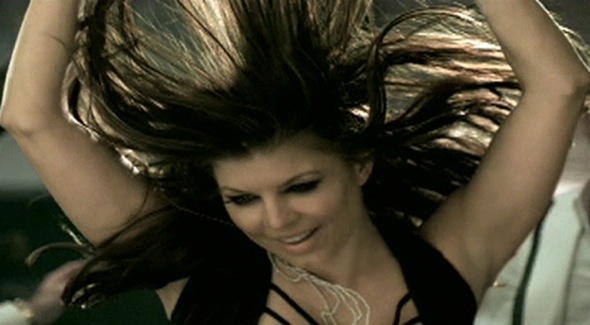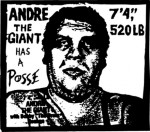
 Callot: Geez, what’s gotten into Lee? Anyway, “Distraction from thought” isn’t necessarily bad. If listening to “I Gotta Feelin” can successfully stop the human mind from working, it could be a tool for conquering the self-world duality that stands between us and nirvana. This song could work the same way as a yogi walking across hot coals or sleeping on a bed of nails.
Callot: Geez, what’s gotten into Lee? Anyway, “Distraction from thought” isn’t necessarily bad. If listening to “I Gotta Feelin” can successfully stop the human mind from working, it could be a tool for conquering the self-world duality that stands between us and nirvana. This song could work the same way as a yogi walking across hot coals or sleeping on a bed of nails.
 Perich: I’d debate whether the immersion in pure sensorium that this song engenders (esp. if played at high volumes in a humid club with attractive humans in tight clothes nearby) is what the Siddhartha had in mind. Although is there anything in the texts that says it isn’t?
Perich: I’d debate whether the immersion in pure sensorium that this song engenders (esp. if played at high volumes in a humid club with attractive humans in tight clothes nearby) is what the Siddhartha had in mind. Although is there anything in the texts that says it isn’t?
 Callot: Sensory information could be said to have two possible results on the mind: the senses could present the mind with a world that implies some compelling hidden truth, or the senses could present a series of dissonant and arbitrary assaults that urge to mind to turn away.
Callot: Sensory information could be said to have two possible results on the mind: the senses could present the mind with a world that implies some compelling hidden truth, or the senses could present a series of dissonant and arbitrary assaults that urge to mind to turn away.
If the two results could be explained by episodes of Star Trek: The Next Generation, they would be “Clues” and “Chain of Command – Part Two”. In “Clues,” the crew of the Enterprise are compelled by tiny inconsistencies to investigate an incident that they don’t even remember occurring. This investigation eventually reveals the presence of dangerous aliens who nearly destroy them. Picard tells the aliens that humans are naturally curious, and cannot resist a riddle. He then contradicts himself by making the riddle slightly more intricate, which succeeds in preventing the crew from investigating a second time. The human mind can be distracted from its constant contemplation, and must be, if humanity is to be saved from destruction.
In “Chain of Command – Part Two,” Picard is tortured by a Cardassian. He is deprived of sleep, of food, of dignity and of self. The Cardassian demands that Picard say that there are five lights in the room, when there are only four. Picard struggles to retain his self by rejecting the arbitrary and artificial reality insisted upon by his tormentor. Eventually, Picard is rescued. Afterward, Picard reveals that, in the end, he saw the fifth, imaginary light. It was only his stubborn conscious rejection of his tormentor that allowed him to maintain his grip on a reality that he could no longer experience. Presented with a world that made no sense, Picard chose to reject his sensory reality rather than give up his sense of self.
The music of the Black Eyed Peas is like the alien mystery and the Cardassian tormentor, in that it occludes the rational world. Are we better off accepting the Black Eyed Peas or rejecting them? Is the suffering of self-knowledge worth it, or is the truth only the acceptance of that suffering?
![]() Fenzel: There is a third option (or probably more). The senses could be instrumental, and information received by the senses could be used to provoke a response. The truth or falsehood of the information does not strictly matter in such cases as much as the action/reaction complex.
Fenzel: There is a third option (or probably more). The senses could be instrumental, and information received by the senses could be used to provoke a response. The truth or falsehood of the information does not strictly matter in such cases as much as the action/reaction complex.
One key example of this would be in the TNG episode “Silicon Avatar,” when the Enterprise uses graviton bursts to attract the Crystalline Entity, only to find that it is also using graviton bursts back to try to communicate.
Dr. Marr focuses the graviton bursts bursts into a constant beam that damages the Entity, (which has killed a whole lot of people). Picard, upon realizing the scope of the communication with the entity, orders the beam stopped, but Dr. Marr prevents it and it kills the entity.
Throughout the episode, Picard is uneasy about the instrumental nature of this communication — what will it _do_? What will be its _result_? Was the sensory signal the Enterprise sent to the Entity — ten graviton bursts per second — true, or was it arbitrary? Neither, it was intended to provoke a reaction.
Are we better off disciplining our minds to shut out the Black Eyed Peas, or in trying to drill into it to find out the hidden meaning of the song?
Perhaps we are better off dancing to it, and only in the dancing do we find the full work, from whence we can draw further interpretation.
It didn’t work out quite so well for the Crystalline Entity, but you can’t win ’em all.
 Wrather: I’ll interject here to point out that Dr. Marr will be one of my acting professors next year.
Wrather: I’ll interject here to point out that Dr. Marr will be one of my acting professors next year.
 Fenzel: DO NOT LET HER LOCK OUT THE COMMAND CONSOLE!
Fenzel: DO NOT LET HER LOCK OUT THE COMMAND CONSOLE!
I always find the Black Eyed Peas a little confounding. Their lyrics are painful, and delivered painfully, but they have a really great producer (or maybe just really good taste in producers). I think if I didn’t speak English, this song would be great. But as it is… I like the beat enough to want to like the song, but I dislike the vocals enough to actively hate the song. I had the same reaction to “Boom Boom Pow” a few months back, and to “Where is The Love” before that.
Oh, and about the video, I think it’s great that:
1) Fergie apparently gets ready for parties by showering, trying on an outfit, putting on a ton of lipstick, and then jumping back in the shower.
2) Rather than going up in the club, they seem to be having a dance party in someone’s apartment. And with all the lights on. (And is it just me, or does something about the combination of bright lights, shakey camera work, and throbbing 80s synth bass scream COCAAAAAINE!)
3) At the end of the video, the party has jumped the shark. Everyone is stumbling around, falling over themselves, hiding their faces in their hands, and in general wishing that they had stayed home. It doesn’t quite end with a shot of them all vomiting into a trash can, but it might as well.
I watched that entire video so as to make an informed decision. (also for some of the eye candy)
Mark… you’re right. Get the eye spikes.
I read this article and got the damn song stuck in my head, way to go ruin my day guys.
To me, it sounds like an American version of German Atzen Musik. If you listen to Frauenartzt (esp. Das Geht Ab) you can hear many of the same themes.
If it were in English, my love for the song would probably be
somewhere near Lee’s love for this song. It carries many of the same themes and the music video has a similar theme, albeit European not American.
@Greg: I listened to a bit of “Das Geht Ab” and you’re right. Both Frauenartzt and Will.i.am. borrow heavily from that “Miami bass” style.
The dumb (and true) answer is that the Black Eyed Peas sought to make a song that would make money.
Since I’m bored, I’ll analyze this further. Music is largely suggestive, as is dance. I despise clubs and dancing, in addition to popular music, but I have thrashed, moshed and slammed to various forms of metal and punk (and the odd rock/rockabilly). The transcendence occurs somewhat, but this is really due to the sensory assault and not much more. I don’t really think there’s all that much to analyze, but, then again, I’m a materialist in the traditional sense of the term.
As for the meaning of the song, well, it’s a harsh reminder of our vapidity, both as “individuals” and as a culture. Hearing drivel such as this, which is utterly worthless trash, reminds me of how subjective tastes are, and of the paradox of my own snobbery and self-styled tastes, which are almost entirely geared around the artificial factors of musical and compositional ability (i.e. bands like Death, Dream Theater, John Coltrane, Kansas, anything Devin Townsend, Led Zeppelin, Morbid Angel, the Faceless, Between the Buried and Me). Furthermore, shouldn’t aesthetics be democratic (are they not already thus)? I would certainly hate such a situation, but it might be more just.
Also, for stokes: their DJ is David Guetta, if you want to know. I abhor his music as the absolute worst of electronica, and curse every second I have spent hearing anything he’s touched. He’s actually worse than Tiesto, which is amazing. This is all my incredibly pretentious, prog-metaller opinion, so take it as you will. The name is there for you, anyways.
I had the same opinion of the song as Stokes before seeing the video. Now I’m past that and just flat-out think it’s hilarious (in a painful way). Not because the hott bodz are so hott, but the message the song is actually trying to send, imo. It all centers around that shark bullseye thing on the wall in a bunch of the shots. The song is actually a call to the patriotic duty of every American citizen to go out and spend-spend-spend and participate in the tactile consumer culture driving our economy, all in order to continue its current upward trajectory- and why not have a good time, while we’re at it? We’re AMERICANS, dang nabbit, it’s our duty to spend recklessly and be alcoholics- it’s what we’re known for! Tonight is going to be so awesome because we Americans are so good at forgetting the bad stuff surrounding us and just living in the moment- and in this case, willfully choosing to reject the reality around us in order to make that reality better once we come back down to earth (to tie it into y’all) by improving the economy through spending a lot. Notice he says he’s GOT his MONEY, not that he has a credit card or any other means of spending. He has actual cash, not credit, with which to use as ammunition against the fears of those humble citizens worried about their jobs and the future of this country. So perhaps the song itself isn’t meant to be the transcendental experience, but it is telling its listeners to have one by spending and partying in order to repair the economy more. That way every subsequent tonight is better than the last.
The more I think about this song, the more I think the real key to interpreting it is to watch the pronouns. The speaker in the lyrics and the speaker’s relationship to the listener modulates during the song. The song seems to be nonsensical because the context of the lyrics changes, line by line in some places.
For example, “I got a feelin’ tonight’s gonna be a good night” is general and conceptual, probably said to oneself. “Jump off that sofa!” is very specific, said to a specific person (who is presumably on a sofa). “We know what we say, party every day, pa pa pa party every day” is said by a group of people in unison.
The transitions and repetitions in the music, as well as how the vocal part is passed among the different singers, cues that the song is passing through multiple different stages of the same night — it’s the lyrical equivalent of a cubist view of a night out on the town, you get the shapes and contours and geometries of different sorts of discourse, but drawn from different locations in the evening. Out of their original contexts, they seem misplaced, startling, counterintuitive — but part of the goal of it is to give you a sense for the whole object, which you can never really look at all at once.
So, just as looking at the front of a person doesn’t include their back, and thus misses that essential part of their shape, thus listening to the discourse of a night on the town from only one moment, one person, one perspective makes you lose the shape of the whole — and it is very rare and difficult to be able to communicate that entire shape without making something that, on its face, sounds like nonsense.
I think there is an alternative interpretation to the notion that it sounds like nonsense because it is nonsense. People seem to take to it quickly — at least some of the song’s large, receptive audience seems to understand at least part of what it is accomplishing intuitively, and I think they seem to relate to it.
Maybe it sounds like nonsense because its contours are discontinuous, because it shows you parts of its whole, but not with the form and connection and comfortable frame of reference people have come to expect from their songs and pictures.
And I do think that dancing to the song is part of the whole as well. It’s a song where at least part of it works best if the audience is singing and dancing around.
I’ve been mulling over this idea for a while — that a lot of party music plays with this gear-shift in perspective, that part of raising the stakes in a party song is switching the person and number of the pronouns and the context of the lyrics. The function of this is to address the relationship between the individual and the crowd, and, one level down, the relationship with the individual’s own feelings, needs, wants and aspirations and the feelings of the group — and to speak to their uneasy merging through the juxtaposition.
There is an element of losing oneself in party music — of the act of merging with the dancing crowd — and I think that discontinuously contoured lyricism: I’ll call it festivo-cubism — plays an important part in it.
My favorite example of this — and the song that inspired my interpretation of this song — is an Andrew W.K. song off of “The Wolf” that was released as a single in Japan but is only on the album in the states: “Long Live the Party.”
“Long Live The Party”
I want to have a party
I want to have a party
I want to have a party
I want to have a party
You cannont kill the party
You cannont kill the party
You cannont kill the party
Long Live The Party
I want to have a party
I want to have a party
I want to have a party
I want to have a party
You cannont kill the party
cannont kill the party
cannont kill the party
cannont kill the party
Long Live the Party
Do you care, what you are?
Where’s your pride?
We don’t know
But we dont wonder why
I want to have a party
I want to have a party
I want to have a party
I want to have a party
You cannont kill the party
You cannont kill the party
You cannont kill the party
Long Live The Party
I want to have a party
I want to have a party
I want to have a party
I want to have a party
You cannont kill the party
You cannont kill the party
You cannont kill the party
Long Live The Party
The conquest will survive
The more that you can give it, then the more it will be
And if you do not have it, you can take it from me
All we ever wanted was a thing to believe,
And now that we have found it, we have all that we need.
The more that you can give it, then the more it will be
And if you do not have it, you can take it from me
All we ever wanted was a thing to believe,
And now that we have found it, we have all that we need.
We have found our pride.
The critic in me really likes this Andrew W.K. song because the semantic progression is clearly aligned with the formal and lyrical progression of the song — it’s a huge hint that says, “Yes, the pronouns matter, yes, the voice is shifting to different contexts on purpose, because everything else in the song is also shifting, pointing big red arrows at it.” But Andrew W.K. is a very cerebral songwriter who rewards and jokes with listeners who are formally minded.
After thinking about it a lot, I think “I Got a Feelin'” is very similar to this Andrew W.K. song, with the additional layer of giving you snippets from the evening as it actually played out, which follow a more specific discourse, partly to take pleasure in how out-of-place they feel while at the same time being very familiar, exploding the reality of the song while pulling in the audience that “gets it,” and at once making the piece less accessible and easier to identify with.
Just because someone has to say it: how hilarious is it when Will.I.Am shouts “Mazeltov!” and the vocodered Fergie responds with “L’Chaim!”
@stokes: almost as hilarious as when Jay-Z, in the song “Roc Boys (And the Winner Is…)”, said “mazel tov” and “l’chaim”, amid a slant-rhyme of “black bar mitzvahs” on “it’s a celebration bitches”.
that wasn’t the first time someone paid homage to that chappelle’s show skit – kanye had already used that line prominently in “celebration” – but i can’t think of an earlier mainstream hip-hop artist to paint jewish culture in such a flattering light.
maybe the beastie boys, but that was by example. =)
@Fenzel: That song’s lyrics look to me more like a Communist Party propaganda song than a dance party song. Instead, the progression is about how as an individual, the commrade was oppressed and poor and what-not, but once he/she bans together with their fellows, they’re part of the whole and unstoppable. But that’s just me.
@Rob: I thought about “Roc Boys,” too- it’s actually my favorite song on that album. The “drinks is on the house,” after all, how can you not love it? Anyhoo. Does Adam Sandler say “mazel tov” on any of his albums, maybe?
Am I alone in noting a strange melancholy in the song? Something about the tempo, the chord progression (especially the move to minor vi), the way the lyrics seem to come at half speed compared to the groove (especially when Fergie sings “woo-hoo” during the chorus), and the way it never really takes off. (Though there are probably a bunch of remixes with more aggressive feel.)
It’s almost as though the message of the song is that it’s a tremendous struggle to have a good time.